[I initially started out writing these reviews for ComoSur, but the site has, unfortunately, had to suspend operations. So, although the first few of these will be a bit behind schedule, I thought I’d move them here to the blog and then get them on track with the show. I also promise to cut down the length of these in future posts – these got a bit long.]
Masterchef is often viewed, particularly by those of us in the restaurant world, as a sort of ugly stepchild of the Top Chef franchise. But it really isn’t – first off, the original Masterchef, the UK version, was around years before the first episode of Top Chef was ever dreamt of, having first been broadcast in 1990. But there’s no question that the MC franchise has engendered more national spinoffs than any television cooking competition in history – actually, probably than any television competition of any sort. And it doesn’t have a set format – each national version takes their own approach, from the matter of fact, stiff upper lip British version, to the fun and games and demonstration classes of the Australian, to the American Idol-esque US approach.
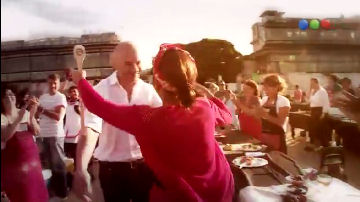
Argentina launched its first season last year, to much anticipation, that unfortunately was met with much disappointment. In some sort of bizarre “let’s be transparent and show them everything” fantasy, the first weeks were devoted to interminable hours of watching contestant hopefuls cook in the wide open spaces of Buenos Aires’ horse-racing track, the Hipodromo. There the illusion that the trio of judges was the driving force behind whittling down to those who actually entered the studio was trashed, as we watched functionaries with clipboards running around, kicking people out or passing them on to have their dishes tasted by the judges. There was talk of bribes being exchanged for moving forward. There was talk of politics entering the fray with friends of government officials getting undeserved nods.
Within a few weeks, most people I know who started out thrilled that Argentina now had its own version of the show had stopped watching. The two or more hour long episodes (even after taking out the commercials) dragged into tedium. The judges seemed as bored as we were as they tasted one after another of dishes that someone’s mom told them was good but shouldn’t have gone past the family dinner table on an off-night.
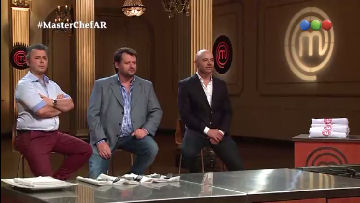
I was actually a little surprised that the show returned this year, and with the same trio of judges – exalted local chefs Germán Martiteguí of Teguí restaurant, Christophe Krywonis, a Frenchman who moved to Argentina decades ago, formerly of the highly successful Christophe, and later Cabernet, restaurants (and whom I found myself sitting behind at the recent Hervé This lecture), and Donato de Santis, an Italian chef from Milan who likewise makes Buenos Aires his home, and is the star behind not only several local restaurants, but has more television shows on here than Emeril Lagasse does in the U.S.
This year’s show, thankfully, eschewed the whittling of thousands of hopefuls down to fifty, starting us off in the beautiful Palacio San Miguel in downtown Buenos Aires, where the already selected fifty were each to present a signature dish to the judges. But first, we were treated to five minutes worth of scenes from upcoming episodes, which sort of defeats the suspense mechanism, as you could see many of the contestants competing down the line. But we’ll pretend that didn’t happen and jump into the selection process.
Each contestant was given 45 minutes to prepare a dish in the kitchens, and then 5 minutes to plate it in front of the judges. Having spent a bit over a decade here in Argentina now, it no longer surprises me when locals don’t seem to quite grasp the time element. Many of them weren’t ready when their 45 minutes were up, several of them used up their five minutes in front of the judges doing anything but getting their food on the plate.
And that began with the first entrant, who spent roughly half his 5 minutes singing about risotto, something he wasn’t preparing, and then presented a barely cooked, dripping in oil prawn tempura – chef Germán, who is the “heavy” of the trio, suggested that the only cooking he should be doing was in song, not in the kitchen. May as well start off with a bang.
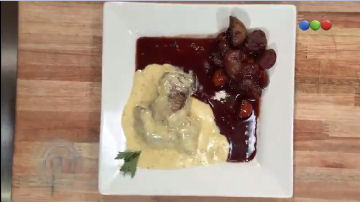
Local classics, with twists, dominated the signature dishes. The second starry eyed hopeful announced he was cooking fish in a blue cheese cream sauce served with sweet and sour potatoes. I clenched. So did the judges, who rolled their eyes and began muttering about this ill-conceived dish in the Argentine canon. All three opined to young Pedro that dumping already cooked pieces of fish into a boiling blue cheese cream sauce was likely not a good move – but even they weren’t prepared for the disaster of his little Andean potatoes and cherry tomatoes glazed in burnt caramel and then “finished” by the pouring of red wine over them – unreduced, right out of the bottle.
The announcer points out that these two not getting through is proof, proof I tell you, that the judges have raised the bar and aren’t letting anyone through who doesn’t deserve it. Which implies that last year they might have let one or the other of these two through.
From there, it varies, some get through, some don’t, some plates look and sound interesting, some don’t. We don’t, thankfully, see all fifty people present their plates – some are never seen, of those who are, some get a few minutes of spotlight, others are intercut in a sort of Reality Bites jumble.
A bit of local racism arises, when a young Chinese woman, Sol, who grew up here, presents a traditional, and delicious Chinese eggplant dish. Chef Germán, while admitting it was a great plate of food, opines that, being Chinese, he doubts that she’ll be up to the task of the competition where she’ll be expected to cook things that aren’t Chinese. She looks appalled, and responds with a laser-like stroke, that after the complexity of Chinese cuisine, cooking Argentine food is more or less something she could do in her sleep, blindfolded, and with both hands tied behind her back. The other two judges hastily pass her through, looking thoroughly embarrassed.
There are some strange yes votes as well – a trio of women who all get through, despite comments from the judges like, “nearly raw pork”, “over-thought and pretentious”, and, “we really don’t like the flavors”. One imagines the director or producers whispering into their earpieces – yes, no, no, no, YES… a la Madeline Kahn.
Although there are tears, and the occasional mild cursing, most of the “no” votes are taken in stride. And in the true Argentine fashion of unconditional support, the friends and family awaiting the rejected supplicants cheer, clap and dance around in joy when their friends exit, dejected.
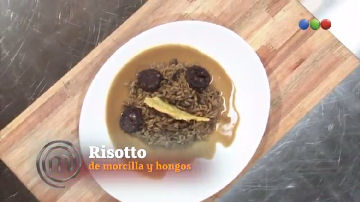
But not all take it so well. When young Diego presents a risotto that is nothing more than a pile of murky rice, chef Donato gives him another chance, letting him return to the kitchen to try again. He returns with another pile of rice, this time heaped in a pool of milky brown liquid. When chef Christophe refuses to even taste it, Diego throws a fit, screaming about his civil rights, and demanding that all three of them taste his food. Bizarrely, they do, and then unceremoniously tell him to take a hike.
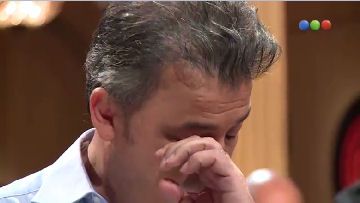
We also have the Hallmark moment, when the corpulent Francisco shows up, singing away, though not wasting time, with a traditional “pasta e fagioli”. For some reason, chef Donato feels the need to explain the dish, “pasta and beans”, to his fellow judges, noting that it contains, shockingly, pasta and beans. The pasta is so well made that chef Christophe dismisses it as “bought from a professional pasta maker”, to which Francisco humbly replies, “no, I made it myself”. Chef Donato breaks down tasting the dish, and we are treated to a solid four minutes of him weeping, wiping his eyes and nose with his fingers for the first couple, and then with a napkin for the next.
Apparently unsatisfied with not having shown the initial whittling process, we regress to last year’s first episode to show part of the Hipodromo debacle, leading to a return attempt by Mercedes, one of the contestants eliminated in last year’s season. She gets back in.
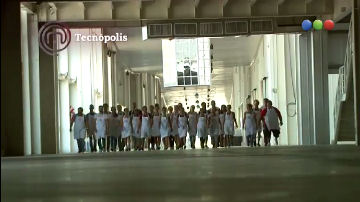
And more. And more. Then, without warning nor commentary, we jump to roughly two dozen of them left, and across town to Tecnopolis, a science and technology theme park on the outskirts of Buenos Aires. We’re at the last elimination before the real show starts. And, there are numerous contestants we haven’t seen before – are these the “red shirts” of the competition? Yes, yes they are, as none of them make it through to the final cut – we barely get their names flashed on the screen in passing.
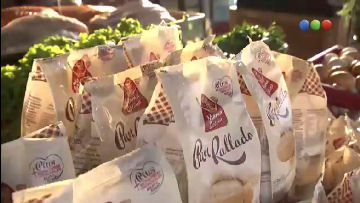
The task, create “the best milanesa of their life” (they’re offered their choice of different meats and vegetables to bread and fry to make their milanesas). They’re given 45 minutes to put the plate together, with an admonition from chef Germán that “a milanesa only takes five minutes to cook, we want to see how you work during the other forty minutes”. Chef Donato does a grand reveal as a huge curtain drops to reveal the contestants’ “supermarket” of ingredients. Over the next twenty minutes or so, we get numerous, varied angle shots of a bags of breadcrumbs from one of the sponsors.
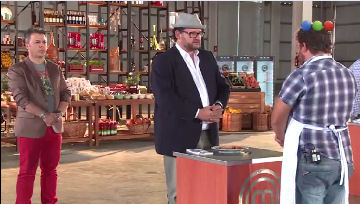
The last competitor through, Matias, is grilled by all three chefs, as his plate just is on the border of being acceptable to get through. He protests that he makes it all the time and his fiance loves it. Chef Germán points out that while she’s likely in love with Matias, he’s not, and while he’s going to pass him through, he intends to be Matias’ worst nightmare, week after week after week, until he breaks him. Why not just eliminate him now? Doesn’t make for “good TV” I suppose.
Fin.
[…] the above mentioned santurzana, a salsa verde, and the uniquely Argentine roquefort sauce (pretty much an abomination, created at some point in this country’s past, no doubt to mask the off flavors of fish that […]
[…] When Masterchef came to Argentina I wasn’t impressed. Neither were a whole lot of other people. I wrote a fair amount about it back when it aired for two seasons in 2014 and 2015. This year they brought it back as a “celebrity” version, with local stars from the theater, television, music, and sports world. I didn’t have high hopes, just because of the past two seasons, and because celebrity versions of these shows are usually worse than the regular ones. And, in some ways, this was too – early on, when the folk who were there simply because they were stars, or really, mostly, has-beens, but couldn’t cook a microwave dinner, were on. But they got eliminated quickly, and it turned out there were quite a few who were actually pretty damned good cooks… […]